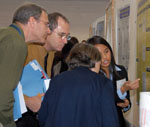|
by Cindy Abole
Public Relations
2003 Nobel Prize laureate Peter Agre, M.D., met with medical and
research students Nov. 6 as part of the 2009 Perry V. Halushka MUSC
Student Research Day. Agre told participants how America and the
scientific community needs more bright, creative and fearless young
people and that the true joy in research requires taking risks, some
dumb luck and the ability to try different things.
Agre gave the keynote speech, “A Life of Science,” where he spoke about
his life journey in science leading up to his professional success in
receiving the Nobel Prize for Chemistry about six years ago. Agre was
recognized for his landmark discovery of aquaporins, the channels in
cells that control water molecule transport via cell membranes.
A protein chemist and cell biologist, Agre said researchers and
scientists have a responsibility to share their work and research
progress with American taxpayers. Although he continues with his
research, his immediate role is to promote the value of science and
research in America. Earlier in February, Agre was inducted as the
163rd president of the American Association for the Advancement of
Science, the country’s largest scientific organization.
“I consider this a wonderful opportunity to meet students and
contribute experiences that I can share and to encourage these young
researchers in their work, ideas and efforts,” said Agre. “At the same
time, I’m also a learner who’s interested in gathering any takeaway
thoughts from this campus and special opportunity. I feel it’s
important for laureates to share of themselves with the scientific
community and students in particular. This is a part of their legacy
and it is a privilege for me to take part in this.”
 2003
Nobel Prize laureate Dr. Peter Agre discusses Nathan Perron's poster,
“New Drug Leads as Potential Treatments for Calcium-Induced Retinal
Degeneration.” 2003
Nobel Prize laureate Dr. Peter Agre discusses Nathan Perron's poster,
“New Drug Leads as Potential Treatments for Calcium-Induced Retinal
Degeneration.”
At
midday, Agre had lunch and an informal talk with 10 graduate studies
students in the Basic Science Building. Attending were Camine Gentile,
Sarah Brice, Marisa Meyers, Matthew Pave, Hsin-I Hung, Jacob Beckley,
Peter Tang, Arelis Salas, Thomas Mullen and Danielle Guiterrez.
“Dr. Agre was very nice, down to earth and approachable,” said Marisa
Meyers, a fourth-year doctoral student. “He told great stories and
anecdotes on science, research and his own journey through life and
even shared mistakes he made along the way.” Agre took some time to
speak and get to know a little about each student at the luncheon. He
asked each student to talk a little about their research, plus
education and science backgrounds. Overall, he was positive and shared
suggestions and feedback on how and why their research is important and
encouraged them to keep pushing it forward.
Earlier, Agre attended the Student Research Day Poster Session, met
with faculty and scientists including Janardan Pandey, Ph.D., professor
of microbiology and immunology; Robert Stuart, M.D., professor of
medicine, Division of Hematology/Oncology, Hollings Cancer Center;
Yusuf Hannun, M.D., Ralph Hirschmann Professor and Chair, Department of
Biochemistry and Molecular Biology; and Perry Halushka, M.D.,
Ph.D., College of Graduate Studies dean.
 First
place winner in the Clin/Prof/Masters II Poster category Rebecca G.
Lopez presents her case to judges during the Nov. 6 Student Research
Day. First
place winner in the Clin/Prof/Masters II Poster category Rebecca G.
Lopez presents her case to judges during the Nov. 6 Student Research
Day.
“Dr. Agre’s current research interests are focused toward the
application of his Nobel Prize-winning discoveries to reveal new
avenues for prevention or treatment of malaria,” said Janardan P.
Pandey, Ph.D., professor of microbiology and immunology, who briefly
met with Agre to talk about his research on malaria and other related
topics.
Agre holds two patents on his Nobel Prize winning work on isolation,
cloning and expression of aquaporins. He is a professor , Department of
Biological Chemistry at the John’s Hopkins School of Medicine and
Bloomberg School of Public Health. In 2007, he was named director of
Johns Hopkins Malaria Research Institute and served as vice chancellor
for Science and Technology at Duke University Medical Center. He also
is a member of the National Academy of Sciences and American Academy of
Arts and Sciences.
 Dr. Peter Agre, far left, and Dr. Perry Halushka, far right, congratulate the winners of the 2009 Student Research Day. Dr. Peter Agre, far left, and Dr. Perry Halushka, far right, congratulate the winners of the 2009 Student Research Day.
Student Research Day 1st Place Winners
Undergraduate I Poster: Alexandria C. Bahan
Clin/Prof/Masters I Poster: Laura R. French
Clin/Prof/Masters II Poster: Rebecca G. Lopez
Clin/Prof/Masters III Poster: Emily C. Hendrix
Clin/Prof/Masters IV Poster: Nathen D. Head
PhD I Poster: Jacob T. Beckley
PhD II Poster: Marisa A. Meyers
PhD III Poster: (Kinard Gadsden Award): Nathanael D. Pruett
Postdocs/Residents/Fellows I Poster: Santhosh K. Mani
Postdocs/Residents/Fellows II Poster: Jennifer Schepp-Berglind
Undergraduates III Oral: Giffin Daughtridge
Clin/Prof/Masters V Oral: Simon Lehtinen
Clin/Prof/Masters VI Oral: Juliana Head
PhD VI Oral: Kyle Strickland
PhD VII Oral (Eric James Award): Tiffany Baker
PhD VIII Oral (William & Betty Peterson Award): DeAnna A. Baker
Postdocs/Residents/Fellows III Oral: Andrew W. Hunter
Ralph H Johnson VA Medical Center Poster: Emmanuel Reyes-Cortes
Ralph H Johnson VA Medical Center Oral: Brendan O’Connell
Sigma Xi Charleston Chapter Research Award Poster: Yuvaraj Sambandam
Sigma Xi Charleston Chapter Research Award Oral: Gayla Poling
Interprofessional Collaboration Research: Christopher Carter and Paul Goforth
Health Disparities Award: Bridget A. Peters
Friday, Nov. 20, 2009
|





